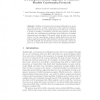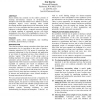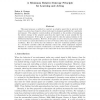1225 search results - page 10 / 245 » Design Principles for Intelligent Environments |
105
click to vote
AI
2004
Springer
15 years 7 months ago
2004
Springer
Building conversation protocols has traditionally been an art more than a science, as their construction is often guided by designers’ intuition rather than by a principled appro...
101
click to vote
CHI
1999
ACM
15 years 6 months ago
1999
ACM
Recent debate has centered on the relative promise of focusing user-interface research on developing new metaphors and tools that enhance users’ abilities to directly manipulate...
126
click to vote
AIED
2005
Springer
15 years 7 months ago
2005
Springer
Our goal in this work has been to bring together the entertaining and flow characteristics of video game environments with proven learning theories to advance the state of the art ...
116
click to vote
CORR
2008
Springer
15 years 2 months ago
2008
Springer
This paper proposes a method to construct an adaptive agent that is universal with respect to a given class of experts, where each expert is designed specifically for a particular...
ACAL
2007
Springer
15 years 8 months ago
2007
Springer
Abstract. In this paper, we apply a theoretical swarm-generating technique to a system implementing cluster-based construction. The technique, known as swarm engineering consists o...



